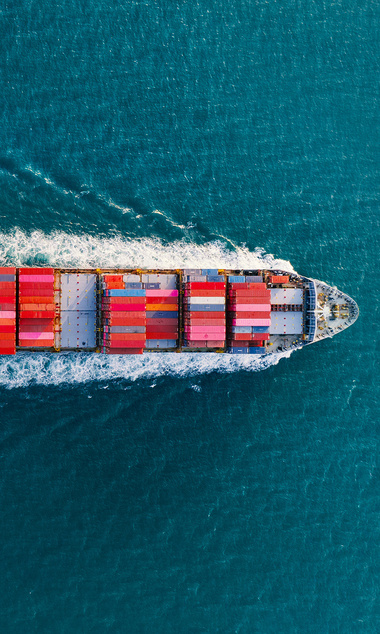
- Blog
- Published on: 28.01.2022
- 4:47 mins
The new supply chain act
5 myths – one opportunity
This blog article contains information on the German Supply Chain Act as it was first introduced in 2022. There were further changes at the end of 2023 and the CSDDD was launched by the EU; you can find all important information on this here.
It is a well-known fact: any disaster that claims thousands of lives will instantly hit the headlines. The textile factory that collapsed in Bangladesh, the dam that ruptured in Brazil, and deforestation of the Amazon rain forest all made it into the news. Yet there are numerous other human rights violations and cases of environmental destruction taking place every day along our supply chains that we never hear about or consciously condone. A stark example is the cultivation of avocados in Chile; a practice so water intensive that it is drying out the entire country. All of Chile’s water resources have been privatized to support this lucrative business, leaving nothing to supply to residents and communities. This has been allowed to happen, despite the UN declaring access, to water a fundamental human right back in 2011 and the resolution being signed by the Chilean government. The mining of lithium, a raw material essential for the batteries in electric vehicles, threatens to create a similar scenario because there are several mines in the arid regions of the “lithium triangle” (Argentina, Chile, and Bolivia).
On January 1, 2023, the Act on Corporate Due Diligence in Supply Chains (German Supply Chain Act) will enter into force for companies with over 3,000 employees. The aim of the act is to provide a pragmatic way to stamp out violations like the examples above. The act will force German companies to continuously review their own activities and those of their suppliers to uncover specific violations of human rights and environmental law, irrespective of national borders and local legislation (labor law, environmental law, etc.). An act of this nature is revolutionary for this very reason alone because it shifts our definition of human rights and conservation into a global context.
Various myths have been circulating since the adoption of the act in the Bundestag. We hope to clear up some of these misconceptions in this blog:
1. „The Supply Chain Act only regulates violations of human rights.“
Strictly speaking, this statement is not incorrect, but it is also not entirely accurate. Violations of human rights may be the focus of the current public debate, but the act also covers environmental legislation set out in three different international agreements and conventions (Stockholm, Basel and Minamata). The environmental provisions of the upcoming act govern the distribution of mercury, the use of some specific pollutants, and the illegal disposal of hazardous waste. For many people involved in environmental law and conservation, this section of the Supply Chain Act is rather disappointing because it was expected to cover a wider variety of topics in more detail. For example, campaigners envisaged legally binding instructions for tracking and reducing the carbon footprint within supply chains in line with the Paris Agreement.
2. “The Supply Chain Act has come from the EU.”
Unfortunately, this is not the case, but it certainly will be in the future. The current Supply Chain Act is a purely German initiative, but it is being watched closely in political circles, particularly by the EU, to see how effective and feasible it is and how is it interpreted in case law. The German act is likely to be used as a blueprint for formulating an EU-wide law that is expected to be implemented by the end of 2025. However, it has already been announced that any equivalent EU law will include much more stringent environmental provisions compared to the German legislation. With this in mind, German companies can and should see the implementation of the Supply Chain Act as a way to prepare for any upcoming, tougher EU laws.
3. “German companies are being blamed for human rights violations by suppliers and producers located abroad.”
This act is not about shifting responsibility. It is about establishing a mandatory, effective monitoring system to ensure that supply chains uphold specific human rights and comply with environmental laws. Nevertheless, it is understandable that many companies feel under general suspicion due to the Supply Chain Act, which is wrong and unhelpful. This impression is being fueled by controversial statements and articles by some politicians and non-governmental organizations. The new act should actually be perceived and implemented as an opportunity for companies, rather than as a general affront.
4. “When the act comes into force, German companies will be liable for all supplier and producer violations across the supply chain.”
The companies affected by the new act are responsible for their own business activities and those of their direct suppliers (tier 1). The due diligence requirement applies to indirect suppliers, meaning that they must establish a framework for handling complaints that allows human rights and environmental risks or violations to be detected. If there is any evidence of risks or violations, the company is obliged to implement risk analyzes and preventative measures or measures to avoid, eradicate, or minimize these risks and violations. The act therefore imposes an obligation to use best endeavors. There is no obligation to succeed or guarantee results.
5. “The Supply Chain Act is too lax and unworkable.”
The act is by no means a toothless paper tiger, although it did lose some of its bite and impact during the development process: For the time being, the act will only apply to companies with more than 3,000 employees (500 employees was the original benchmark) and the liability rules were watered down into an obligation to use best endeavors to monitor direct and indirect suppliers only, rather than the entire value chain. In addition, the affected companies must have their main administrative office, headquarters, or a registered office or branch in Germany. The introduction of the act will be staggered too: From January 2023 onwards, it will apply to companies with 3,000 employees or more. One year later, it will apply to companies with 1,000 or more employees. The act considers all employees based in Germany as being part of the parent company, so from 2024 onwards the act will apply to around 3,100 German companies.
Only time will tell how rigorously the Federal Office of Economics and Export Control will enforce the act. Non-compliant companies that generate a turnover of more than 400 million euro could receive fines of up to two percent of their global turnover and be excluded from public contracts.
To summarize, the aim of the Supply Chain Act is not to “paralyze” German companies and their supply chains. Instead, the intention is to ensure that people can exercise the rights that they are entitled to within the global economy and to improve the quality of life of the people who make it possible for us to source consumer and industrial goods from around the world. To achieve these aims, consistent compliance with the act is only half of the battle – a corresponding change in mindset is also required. Companies must recognize sustainability as a prerequisite for their future success. To gain more control over your resources, we recommend implementing measures such as digital tracking technologies and designing products to function within a closed-loop system.
Our experience in this field comes from working on several projects in the manufacturing industry, particularly the automotive industry. We can, therefore, offer interdisciplinary, cross-functional, process and technology expertise to help you effectively and successfully align your company and shape your sustainability roadmap.




